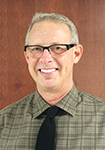By NANCY FRAZIER O'BRIEN
The years of young adulthood and middle age are generally times of adding things — a spouse, a degree, a new job, a new house. But for many people, the senior years are a time of subtraction.
"As seniors age, many times what comes with that is losses — the loss of a home where you might have lived for 40 years, the loss of a spouse or other loved ones, maybe the loss of a driver's license," said Mark Staff, director of the Senior Renewal Program at HSHS St. John's Hospital in Springfield, Ill.

Staff
"Some seniors deal pretty well with those losses, and it does not seem to affect their mood," Staff said. But for others it can lead to depression, anxiety and other mental health issues.
That's why St. John's started the Senior Renewal Program, which provides outpatient counseling services for seniors in a variety of formats — group therapy, individual therapy and family therapy.
"Especially when several losses come at the same time, a program like this can be helpful," Staff said. But for this generation of seniors, who were "taught to pull yourself up by your bootstraps," seeking help for mental health issues carries a certain stigma, he added.
In the group therapy format, even those who might not talk at first can come to the realization that others share feelings similar to theirs, Staff said. Three group sessions dealing with different aspects of mental health are held each Monday, Wednesday and Friday, with some patients participating in all three sessions on a given day and others in just one or two.
The cognitive group "examines the thought processes and how it impacts perceptions, feelings and behavior," while the skills group "explores new life skills and behaviors that will assist with recovery and healing," according to a brochure for the program. The process group "provides ways to express a variety of emotions openly and constructively," it says.
For issues that a patient does not wish to discuss in the group setting, there is individual therapy on Tuesdays and Thursdays and, where appropriate, family counseling, Staff said.
There is not another program like this in the Springfield area, Staff said, and it fills a real need, he continued, noting that the incidence of depression for adults in the U.S. over age 65 is 15 percent. "And that is not just someone having the blues."
Senior Renewal patients, who range in age from 59 to the late 80s, see the program's physician monthly for an evaluation of medications and other needs, according to the program's website. Patients are reassessed every 90 days, using the geriatric depression scale and other tools. Even in the program's first few months —it began June 1 — "we can see improvement in a measurable way," Staff said.
"Subjectively you can really see a difference in mood, affect and sense of humor," he added. "Many come in as not very conversational, but brighten up and begin engaging in the group. It's very exciting to see."
Some patients already have been discharged from the program, and others have begun coming less frequently because of improvement in their mental health status, he said.
The program provides a continuum of care for patients who had been receiving intensive inpatient care at St. John's behavioral health unit, or can serve as "a bridge from traditional outpatient therapy to something more intensive," Staff said.
The Senior Renewal Program currently serves about 20 clients, although not all come on the same days. Groups are limited to eight to 10 people in order to keep everyone engaged.
A nutritious lunch is provided for the seniors each day they come, and transportation can be arranged.
Staff said the care team — which includes a medical director, licensed therapist, registered nurse and a technician in addition to himself — works closely with a variety of local agencies to meet other needs of the seniors in the program.
The assistance provided might include help with a computer, an exercise program or home health services, he said.
Staff said he currently spends "50 to 60 percent" of his time spreading the word about the relatively new program. He contacts assisted living facilities, doctors' offices, psychiatrists and faculty and students at the Southern Illinois University School of Medicine in Springfield and its family medicine residency program, among others.
"There are a lot of agencies and health care facilities that are touching the lives of seniors, so we interface with those and make sure they know about our services," he said.
Copyright © 2014 by the Catholic Health Association
of the United States
For reprint permission, contact Betty Crosby
or call (314) 253-3477.